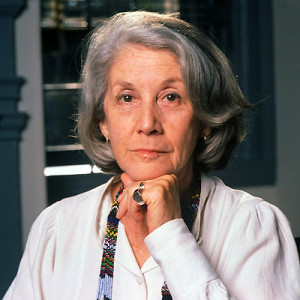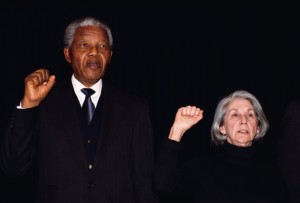I feel obliged to begin by confessing that, when it came to reading the works of white authors in Apartheid South Africa, my interest did not extend much beyond those of Athol Fugard.
No doubt this is because Fugard didn’t just write provocative, anti-Apartheid plays (like his pioneering Blood Knot in 1961); he also defied the Apartheid regime by casting black and white actors (including himself) to perform them on stage.
I think it is under the pressure of desperation that extraordinary things can happen in a human life. And if ever there was a country oversupplied with desperation, it was South Africa in that time.
(Athol Fugard, NPR, March 27, 2014)
 What’s more, I did not come to appreciate Nadine Gordimer’s political activism until I watched her being interviewed by Charlayne Hunter-Gault for PBS in 1987.
What’s more, I did not come to appreciate Nadine Gordimer’s political activism until I watched her being interviewed by Charlayne Hunter-Gault for PBS in 1987.
No doubt this is because Gordimer didn’t just speak of writing novels, which were so threatening to the foundations of Apartheid that they were routinely banned; she also spoke of her anti-Apartheid activism as a civic and moral duty:
One has a responsibility as a human being, as a white African. It’s no good saying I believe there’s going to be a post-Apartheid South Africa … you’ve got to put your life on the line and show that you’re in the struggle.
That she did, while also affirming the adage: the pen is mightier than the sword.
Alas, her laudable expression of shared humanity and self-sacrifice did not inspire me to read her books. It did, however, compel my immediate and lasting admiration. In fact, I demonstrated as much when I invoked Gordimer’s political and moral authority recently to reprimand black leaders of the African National Congress – whose morally bankrupt leadership of South Africa today nearly rivals that of white leaders of the Apartheid regime:
Here is what no less a person than the Nobel Laureate for Literature, Nadine Gordimer, is saying about what Zuma and the ANC are doing to South Africa:
‘The original values of the ANC are being betrayed in many areas of our social life and our political life… I maintain the right to criticize my own party. I feel it’s a duty that we who are in the ANC must say what we think when the ANC does wrong….’ – BBC, May 10, 2011.
Hear, hear comrade!
(“South Africa ‘Betraying Its Values,’” The iPINIONS Journal, Friday May 13, 2011)
 That said, I would be remiss not to acknowledge that, for many, Gordimer was more novelist than activist. Indeed, this, presumably, is why her most famous ANC comrade, Nelson Mandela, won the Nobel Prize for Peace in 1993; whereas she won the Nobel Prize for Literature in 1991.
That said, I would be remiss not to acknowledge that, for many, Gordimer was more novelist than activist. Indeed, this, presumably, is why her most famous ANC comrade, Nelson Mandela, won the Nobel Prize for Peace in 1993; whereas she won the Nobel Prize for Literature in 1991.
Coming full circle, though, I am constrained to acknowledge that the Nobel Committee conferred upon Gordimer a level of recognition for anti-Apartheid activism that Fugard has never enjoyed.
I did not consider this an oversight until the Committee conferred similar recognition upon another white South African writer, Joseph M. Coetzee, in 2003. After all, even though writing about and living in the same Apartheid South Africa, Coetzee never put his life on the line and showed that he was in the struggle the way Fugard and Gordimer did.
Moreover, I’ve read the works of enough Nobel laureates to assert that Fugard’s not only have as much literary merit, but also had far greater impact on shaping the process from apartheid to democracy than those of any other white South African writer.
Nevertheless, to avoid insulting Gordimer’s legacy (if it’s not already too late), I shall close by hailing her pioneering and enduring fight for the equal rights and humane treatment of all South Africans, which in recent years included those suffering from HIV/AIDS.
Reports are that she died peacefully at her home in Johannesburg on July 13. She was 90.
Farewell, Nadine.
Related commentaries:
South Africa betraying…